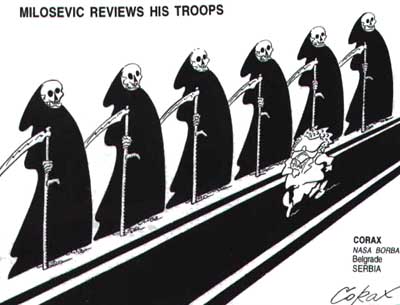|
|

Jewish World Review / June 10 , 1998 /16 Sivan, 5758
William Pfaff
VIENNA -- The Kosovo problem revolves around the
sovereignty problem. In law, Kosovo's conflict with the
Serbian government is an internal issue within the Republic of
Serbia. Kosovo is a nominally autonomous province of Serbia,
which with Macedonia makes up the sovereign Federal
Republic of Yugoslavia, of which Slobodan Milosevic is
president.
To interfere with Serbia's repression of the ethnic Albanians,
who are overwhelmingly the majority population in Kosovo,
is to intervene in Serbia's internal affairs. Thus what the
international
Mr. Milosevic can ignore toothless diplomatic warnings and
reimposed sanctions. NATO threatens to send troops to camp
on Kosovo's borders with Albania and Macedonia in what is
called a "preventive deployment." Preventive of what? Of
the spread of war, even though the immediate problem is not
international war but ruthless uprooting and repression of a
civilian population inside Kosovo.
Britain's Prime Minister Tony Blair, joined by the United
States, is proposing that the UN Security Council authorize
"all necessary means"to stop the conflict from spreading to
Albania and to Macedonia, which has a large Albanian
minority.
This was the language which authorized the Gulf War.
However Iraq had invaded Kuwait, an international crime. In
the Kosovo case, what is necessary is an intervention inside
Kosovo and Serbia to halt a crime against humanity. There is
no fully acknowledged international precedent for this.
Why not create the precedent? The international community
intervened in Iraq to protect persecuted Kurd and Shi'ite
Moslem minorities, although none too successfully. Iraqi
sovereignty was thus abridged by the Security Council,
although in the aftermath of a war.
The United States has in the past found implausible but
tolerated grounds for military violations of the sovereignty of
Panama, Grenada, the Dominican Republic, Cuba,
Cambodia, and Laos. Where there's a will, there's a way, as
Washington knows.
Air intervention against police and the Serbian military forces
attacking civilian centers in Kosovo, and against their lines of
communication and bases, is presumably feasible in military
terms. On the Iraqi precedent it would seem legally feasible.
Internationalizing the problem is also imaginable, and
perhaps inevitable, given the radicalization produced by the
latest Serbian attacks on the Kosovars. That is what the
international community did when Croatia and Slovenia
claimed independence. It recognized them as independent
states. The Yugoslav army no longer was engaged in
suppression of internal dissidence but was committing
international aggression. International assistance to the
victims was legitimated.
That precedent is not the happiest one, given what followed.
But the international community might this time do well what
in 1991-1992 was turned into a catastrophe by the divisions
and pusillanimity of the western powers.
There would be rough justice in this, too, since there are
Communist precedents. In Finland in 1939 and in Poland,
midway in the second world war, Stalin recognized "exile
governments" made up of Comintern officials, and made it
Soviet policy to put them in power. He failed in Finland, but
succeeded with the so-called Lublin Committee, which was
installed in power in Poland in 1944 by the Russian army.
The international community has it in its power to recognize
the clandestine coalition government created in Kosovo, and
the verdict of that government's 1991 referendum on
Kosovo's independence. The Kosovar leaders have
subsequently conducted an extraordinary struggle to free their
country by non-violent means.
Mr. Milosevic is on prima facie evidence a war criminal. The
atrocities by Serbian forces in the course of the wars between
Serbs and the Bosnians and Croatians were committed under
his authority, and the struggle in Kosovo is a direct result of his
abrogation of Kosovo's former autonomous status in 1988
and 1989.
He and his government blatantly incited ethnic violence there
and elsewhere in the old Yugoslavia, in the run-up to that
country's disintegration in 1991 and the ensuing war to create
a "greater" Serbia.
The prosecutor at the Hague Tribunal on war crimes in
Yugoslavia made it known two months ago that she was
assembling the case against Mr. Milosevic. He has been
spared indictment until now because Washington and the
other western capitals found him useful in getting the Dayton
agreements installed in Bosnia, and because Russia was
unwilling to see him called to account. Russia now would
seem to have had its fill of Mr. Milosevic, and to be ready to
abandon him.
The time has come to demand his indictment and trial, no
doubt in absentia -- but that's all right; it is the principle, and
the precedent, which count. It would be one further step in
the campaign, which is feasible, and by now overdue, to
remove Slobodan Milosevic from the European political
scene.
 Get Milosevic now!
Get Milosevic now!
 community thus far has done, or proposes to do,
to halt Serbia's attacks upon the civilians of Kosovo, is
frustratingly indirect and inherently futile.
community thus far has done, or proposes to do,
to halt Serbia's attacks upon the civilians of Kosovo, is
frustratingly indirect and inherently futile.
 It would be only one factor contributing to a solution, but it
would greatly heighten Mr. Milosevic's difficulties and his
relationship with the police and military who are the targets
of NATO action. It would provide one incentive to reestablish
negotiations on Kosovo's situation.
It would be only one factor contributing to a solution, but it
would greatly heighten Mr. Milosevic's difficulties and his
relationship with the police and military who are the targets
of NATO action. It would provide one incentive to reestablish
negotiations on Kosovo's situation.

6/8/98: Religious nationalism at work in India, Pakistan
6/3/98: Judge the crimes of other eras? How can we, were we there?
5/28/98: So far, so successful for Blair
5/25/98:Asian nations resisting American control
5/21/98: The Communist mainfesto, at 150, prophesied the shape of today's capitalism
5/19/98: Globalized capitalism is more significant than
nuclear weapons
5/13/98:
Negotiating in reality, not
wishfulness
5/7/98:
Things can only get better
and better!
5/5/98:
Racial, ethnic, national barriers disappearing
5/5/98:
Racial, ethnic, national barriers disappearing
4/21/98: A terrifying synthesis of forces spawned Pol Pot's regime
4/19/98: Russian-German-French structure of consultation is good development
4/16/98: Violence in society comes from the top as well as the bottom
4/13/98: Clinton's foreign policy does have a sunny side, too
4/8/98: Public interest must control marketplace
4/5/98: Great crimes don't require great villians
3/29/98: Authority rests on a moral position, and requires consent
3/29/98:Signs of hope in troubled Russia
3/25/98: National Front amassing power
3/23/98: NATO's expansion contradicts other American policies
3/18/98: The New Yorker sought money, but lost it
3/16/98: America's 'strategy of tension' in Italy
3/13/98: Slobodan Milosevic may have started something that can't be stopped